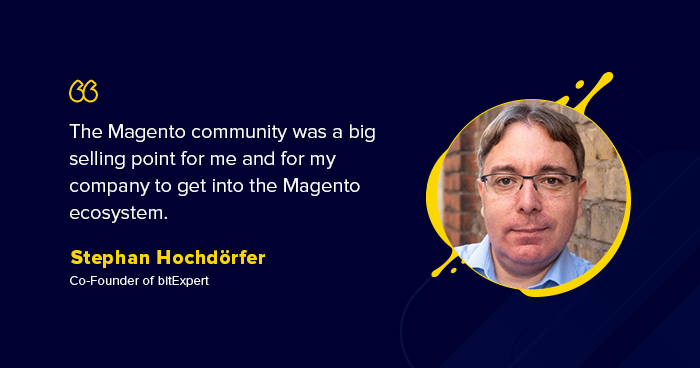
Learning from others’ experience is a great way to broaden your scope and knowledge. It’s always better to have experts around to help and expand the horizon than someone with over a decade and a half worth of experience in starting and running their agency.
Luckily, we recently got a chance to interview Stephan Hochdörfer, Co-founder of bitExpert, who is now making waves in the field of digital transformation through their services.
Lakhani: Hi Stephan Hochdörfer, it’s lovely to have you with us! Could you please tell our readers about yourself? Walk us through your journey so far.
Stephan: Hi, my name is Stephan Hochdörfer. I live in a region in Germany called the German Wine Route. Given that, I might be a bit opinionated when it comes to wine 😊
I co-founded my company, bitExpert, 18 years ago whilst finishing my studies at a university of applied sciences. bitExpert is a technology-focused company helping our customers with their digital transformation journey. Over the years, we grew the company from the two of us who founded the company into a group of companies with about 80 people in 5 different countries with its headquarter being in Mannheim, Germany.
Lakhani: Was there a special reason you chose to work with Magento along with other ecommerce platforms? What would you say is the importance of using Magento to you?
Stephan: At bitExpert, we do not focus on one specific programming language or framework, we try to be agnostic and pick the solution that makes the most sense for the requirements our customers have. Over the years, we’ve been working with a few smaller merchants where Magento 1 was a good basis because the feature set matched what the merchants needed to get started and not much customization was necessary.
At the end of 2015 we were approached by one of our agency customers to build a web2print platform for one of their merchants. We gathered the requirements, had a look at various e-commerce solutions and felt Magento 2 could be a good choice based on what features had to be implemented. Magento 2 felt like a good pick because features like Dependency Injection (fun fact: we might have been the first to create a Dependency Injection Container back in 2004 when PHP5 came out) or Composer felt natural to us because we’ve been using them for years. Obviously, we had some “issues” getting deeper into Magento due to the lack of documentation back then. But somehow, we managed to survive the first projects and decided to stick with Magento.
To this day, Magento makes sense for us and the projects for our merchants. We know the platform best and we are quite well connected in the community itself.
Lakhani: You have been helping store owners with ecommerce store development. So, what’s your thought process before getting into any project?
Stephan: The most important thing for us is to get an understanding of what the merchant wants to achieve and what their budget is. Even though Magento is flexible and can be extended in all sorts of ways, one still needs to be careful of what makes sense to customize and how. There is this fine line between projects that can be done with Magento and projects that should not be done with it, because they don’t follow Magento’s way of thinking. And yes, sometimes we did cross the line, too.
Lakhani: What are your thoughts on Headless, PWA, and other related technologies? How are they going to benefit the merchants and ecommerce industry?
Stephan: Headless and PWA are two different technologies that get mixed up quite a lot. Both on their own and combined can make sense for a merchant but don’t have to.
Headless basically means that I can build a storefront with a different technology than what Magento offers. This can be a PWA application but could also be a more “traditional” application built on Laravel or Symfony or any other kind of framework. This could lead to a faster storefront because you can take a different route optimizing things and give you the option to integrate other 3rd party systems. Maybe the merchant already has a CMS and wants to keep using it. Integrating that into Magento core might be more difficult than having a separate application that would consume data from Magento and the CMS.
Headless can also be interesting if the merchant’s use case does not fit Magento’s way of handling things. For example, a few years back, before Headless was a thing, we built a custom storefront for a marketplace solution and connected it to a Magento backend. It would have been impossible to add all the logic that was needed on the storefront side to Magento but this way we could keep Magento in the game and still benefit from existing functionality.
PWA (Progressive Web App) turns your web application into a kind-of native application. Your web application gets additional “skills” like being able to automatically add an icon to a smartphone’s home screen, offline cache or push notifications. Not all of those skills make sense for an e-commerce application, obviously caching everything won’t work, think of product availability or complex price rules. But it can help to make your e-commerce application be more responsive and load faster for consecutive visits. Since a PWA application runs locally on your device, it needs to exchange data with the server side and here comes the Headless approach into play. Having built PWA-like solutions before PWA was cool – we did our first PWA-like project 10 years ago – I can say it is really a game changer. Being able to develop an HTML application and run it completely offline on a mobile device is really amazing, it blew my mind back then.
And now for the important part: You don’t need React, vue.js, or any other purely Javascript tooling to build a PWA application. You can easily add PWA capabilities to a traditional application by adding a Manifest file, make use of Service workers and cache data locally in LocalStorage or SessionStorage. Frontend frameworks help you to build an SPA (Single Page Application) which then can easily be turned into a PWA but that is not always needed. There are lots of possibilities today to build web applications, it is crucial to understand their features & limitations. If you need some consultancy, I am happy to help.
Lakhani: What do you think about the Magento community? How important is it for the growth of the Magento platform?
Stephan: The Magento community was a big selling point for me and for my company to get into the Magento ecosystem. In a nutshell, Ben Marks introduced me to the Magento community and David Manners made me stay. Also, the German and Dutch Magento communities are extremely welcoming. I made a lot of friends in a short amount of time just by visiting (and speaking at) a few Magento events.
The Magento community is important for the growth of the Magento platform for multiple reasons: If you treat the community well, they will help to improve the Magento platform. A lot of interesting projects have been brought to life by the community.
Let’s take magerun by my friend Christian Münch for example. An awesome tool created over time out of a “let’s have some fun with Symfony Console” moment. Or take the Hyvä theme as another example, Willem Wigman did an awesome job to improve the development of Magento frontends. One should never underestimate the power of a community. I am really curious to see where things are going with the Mage Open Source Community Alliance.
Lakhani: What are your thoughts on online Magento events and which events are you excited about for this year?
Stephan: During the pandemic, I spoke (virtually) at a few events in the Magento & PHP space. I was really impressed by the quality of these events, given not many people had much experience in organizing virtual events. But to be honest, I cannot wait to get back to attend and speak at events in the real world. As a speaker, I need to see the audience and interact with them, speaking to the void is not nearly the same experience. That’s also the reason why I did not submit talks to conferences this year. I feel a bit exhausted when it comes to virtual events, mostly because a big portion of my day job is video conferencing these days to keep up with our customer projects as well as my distributed team. But still, if you need some to speak at your (virtual) event, let me know 😊
Lakhani: How do you think these events improve the Magento experience?
Stephan: The Magento events help to connect easily with other members of the community. It’s easy to get in contact with like-minded people and exchange ideas or discuss things. It’s not only about the content but about the networking aspect. At those events I can easily get to know core developers. If I approach them later with questions, they might be more willing to respond because we know each other. I can also recommend visiting PHP conferences to get to know the people behind Composer, PHPUnit, Xdebug or any other tools you are using. Most of them are really nice people 😊
Lakhani: Where do you see Magento in the future? Any predictions for 2022?
Stephan: I hope for a positive outcome of the discussion between Adobe and the Mage Open Source Community Alliance to increase transparency and community involvement again as I believe that the Magento community is an important pillar to build the future of Magento on.
Lakhani: Can you please share a picture of your workplace? And any tips on how to make a productive workstation since many of us are still working from home.
Stephan: I am probably not the best at asking for work from home advice. After 3 months working from home, I decided to regularly work from our office again. Problem is, I do live in a rural area in Germany with a really, really bad internet connection.
The only advice I can give is to get a good video camera and a good headset or microphone. It’s really no fun if you can’t see or hear people properly on a video conference call.

Lakhani: Who are the top influencers that inspire you?
Stephan: I inspire myself 😉 I don’t really follow any influencers or care what they do.
Lakhani: What does your work-life balance look like? Are there any activities you enjoy in your spare hours? You can share any pictures you like here!
Stephan: Personally, I don’t like the term work-life balance. To me that sounds like your work life and your private life are two independent lives. Being a founder & entrepreneur, work is a big part of my life as everything else. I decide how much and when I work and usually that is a lot because I enjoy what I do. Which pretty much was the reason to start my own company and grow it.
In my spare time, I still like to code for fun. I contribute the open-source projects, I have started a few open-source projects on my own like Disco which is a PSR-11 compatible, annotation-based dependency injection container or phpstan-magentoan PHPStan extension helping you to do some static code analysis. My claim to fame is probably my contribution to Composer to store authentication credentials in an auth.json file.
Besides that, I co-organize two PHP meetups in Germany, one is the PHP UG Frankfurt meetup, the other one is called PHP UG Metropolregion Rhein-Neckar. And yes, I know what you are thinking, this is indeed a German word 😊Since we turned both meetups into virtual events during the pandemic, feel free to pay us a visit. We usually have awesome speakers with great talks scheduled. I might be a bit biased, though.
Lakhani: What resources do you think newbies would find helpful to learn Magento development?
Stephan: I can recommend giving M.academy and mage2.tv a try. Mark Shust and Vinai Kopp provide some really good content on those platforms both for beginners and seasoned Magento developers who want to learn more. Besides that, I can also recommend joining the Magechat Slack or the Magento CE slack.
Lakhani: Please share your tips and advice with our readers.
Stephan: Follow your heart, do what you love and love what you do. I know that sounds a bit cheesy but it is still the best advice I can give.
Again, thank you so much for your time. You’re always kind to me 🙂
Abdur Rahman
Abdur Rahman is the Magento whizz at Cloudways. He is growth ambitious, and aims to learn & share information about Ecommerce & Magento Development through practice and experimentation. He loves to travel and explore new ideas whenever he finds time. Get in touch with him at [email protected]


